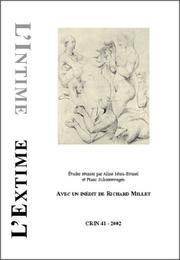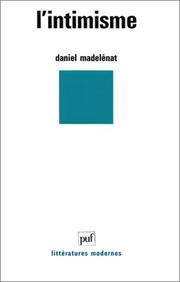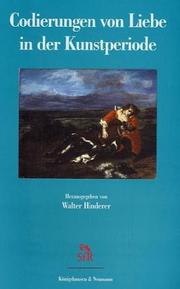| Listing 1 - 10 of 62 | << page >> |
Sort by
|
Book
Abstract | Keywords | Export | Availability | Bookmark
 Loading...
Loading...Choose an application
- Reference Manager
- EndNote
- RefWorks (Direct export to RefWorks)
Book
ISBN: 9791091052283 Year: 2020 Publisher: Pessac (Gironde) : Laboratoire pluridisciplinaire de recherches sur l'imaginaire appliquées à la littérature,
Abstract | Keywords | Export | Availability | Bookmark
 Loading...
Loading...Choose an application
- Reference Manager
- EndNote
- RefWorks (Direct export to RefWorks)
L'intime et ses variations sont envisagés de l'Antiquité gréco-latine à l'époque contemporaine à travers des thèmes et des approches variés : une histoire de l'espace réservé à l'intime dans les demeures, une interrogation sur la naissance de l'intériorité dans la philosophie et la littérature latines, une étude des pratiques du soin de soi et l'analyse de scénographies littéraires de l'intime. ©Electre 2020
Intimacy (Psychology) --- Intimacy (Psychology) in literature --- History.

ISBN: 9042009144 9004334025 9789042009141 Year: 2002 Volume: 4 Publisher: Amsterdam: Rodopi,
Abstract | Keywords | Export | Availability | Bookmark
 Loading...
Loading...Choose an application
- Reference Manager
- EndNote
- RefWorks (Direct export to RefWorks)
Thematology --- French literature --- Intimacy (Psychology) in literature. --- French literature.
Book
ISBN: 9786071639202 6071639204 Year: 2016 Publisher: México, D.F. Fondo de Cultura Económica
Abstract | Keywords | Export | Availability | Bookmark
 Loading...
Loading...Choose an application
- Reference Manager
- EndNote
- RefWorks (Direct export to RefWorks)
Spanish-American literature --- Mexican poetry --- Intimacy (Psychology) in literature
Book
ISBN: 9782921764292 Year: 2007 Publisher: Montreal Universite du Québec
Abstract | Keywords | Export | Availability | Bookmark
 Loading...
Loading...Choose an application
- Reference Manager
- EndNote
- RefWorks (Direct export to RefWorks)
Intimacy (Psychology) in literature --- Lyric poetry --- History and criticism

ISBN: 2130419348 9782130419341 Year: 1989 Publisher: Paris PUF
Abstract | Keywords | Export | Availability | Bookmark
 Loading...
Loading...Choose an application
- Reference Manager
- EndNote
- RefWorks (Direct export to RefWorks)
Comparative literature --- Thematology --- French literature --- anno 1800-1899 --- French poetry --- Intimacy (Psychology) in literature --- History and criticism --- -Intimacy (Psychology) in literature --- Intimacy (Psychology) in literature. --- History and criticism. --- French poetry - 19th century - History and criticism
Book
ISBN: 0231178220 0231543158 9780231543156 9780231178228 Year: 2017 Publisher: New York Columbia University Press
Abstract | Keywords | Export | Availability | Bookmark
 Loading...
Loading...Choose an application
- Reference Manager
- EndNote
- RefWorks (Direct export to RefWorks)
"The author examines how the romantic conception of love has been critiqued, destroyed, and reoriented in modernist and contemporary novels" --


ISBN: 3826014022 Year: 1997 Publisher: Würzburg Königshausen und Neumann
Abstract | Keywords | Export | Availability | Bookmark
 Loading...
Loading...Choose an application
- Reference Manager
- EndNote
- RefWorks (Direct export to RefWorks)
Book
ISBN: 081471742X 9780814717424 9780814717400 0814717403 9780814717417 0814717411 9780814790304 0814790305 Year: 2013 Publisher: New York, NY
Abstract | Keywords | Export | Availability | Bookmark
 Loading...
Loading...Choose an application
- Reference Manager
- EndNote
- RefWorks (Direct export to RefWorks)
Honorable Mention for the 2014 MLA Alan Bray Memorial Award Finalist for the 2013 LAMBDA LGBT Studies Book Award In nineteenth-century America—before the scandalous trial of Oscar Wilde, before the public emergence of categories like homo- and heterosexuality—what were the parameters of sex? Did people characterize their sexuality as a set of bodily practices, a form of identification, or a mode of relation? Was it even something an individual could be said to possess? What could be counted as sexuality? Tomorrow’s Parties: Sex and the Untimely in Nineteenth-Century America provides a rich new conceptual language to describe the movements of sex in the period before it solidified into the sexuality we know, or think we know. Taking up authors whose places in the American history of sexuality range from the canonical to the improbable—from Whitman, Melville, Thoreau, and James to Dickinson, Sarah Orne Jewett, Harriet Jacobs, Frederick Douglass, and Mormon founder Joseph Smith—Peter Coviello delineates the varied forms sex could take in the lead-up to its captivation by the codings of “modern” sexuality. While telling the story of nineteenth-century American sexuality, he considers what might have been lost in the ascension of these new taxonomies of sex: all the extravagant, untimely ways of imagining the domain of sex that, under the modern regime of sexuality, have sunken into muteness or illegibility. Taking queer theorizations of temporality in challenging new directions, Tomorrow’s Parties assembles an archive of broken-off, uncreated futures—futures that would not come to be. Through them, Coviello fundamentally reorients our readings of erotic being and erotic possibility in the literature of nineteenth-century America.
Book
ISBN: 9780804788274 0804788278 0804786097 9780804786096 080479944X Year: 2013 Publisher: Stanford, Calif. Stanford University Press
Abstract | Keywords | Export | Availability | Bookmark
 Loading...
Loading...Choose an application
- Reference Manager
- EndNote
- RefWorks (Direct export to RefWorks)
This is a study of shared feeling as imagined in 18th century ethics, romantic literature, and 20th century psychoanalysis. The term 'intimacy' captures a tension between a confidence in the possibility of shared experience, and a competing belief that thoughts and feelings are irreducibly private. Original interpretations of Hume, Rousseau, Kant, Wordsworth, Coleridge and Austen show how aspirations toward mutual recognition give way to appreciation of varied, non-reciprocal forms of intimacy.
English literature --- Intimacy (Psychology) in literature. --- Romanticism --- History and criticism. --- Psychological aspects.
| Listing 1 - 10 of 62 | << page >> |
Sort by
|

 Search
Search Feedback
Feedback About UniCat
About UniCat  Help
Help News
News